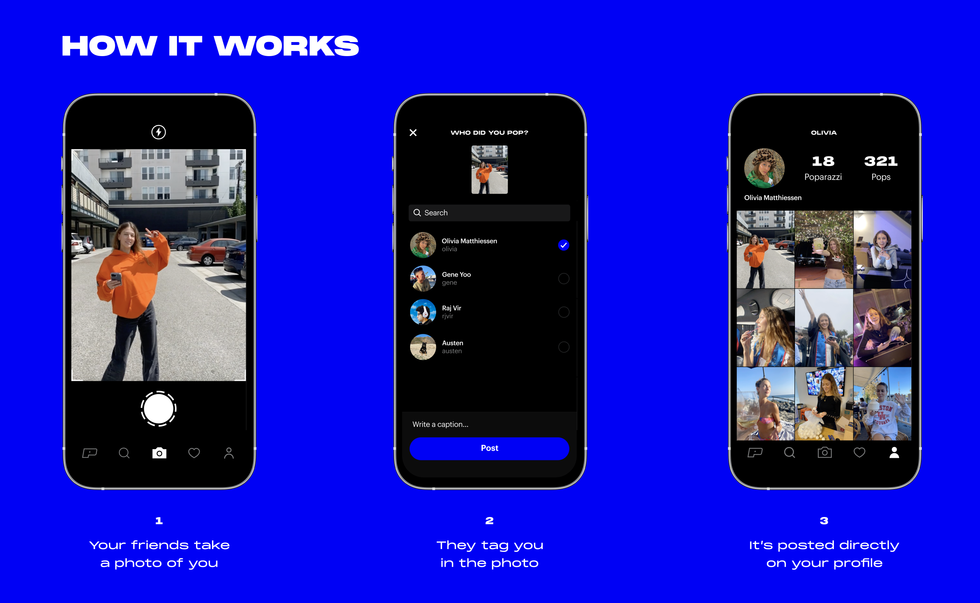
Poparazzi Is the 'Anti-Selfie' App Taking Over Social Media
BY
Sandra Song | Jun 23, 2022

It’s only an hour into the party and I’ve spilled my drink for the third time. In my defense, it's windy in Marina Del Rey today and it's especially blustery on the top deck of the chartered yacht. Except I seem to be the only attendee who minds, mostly because I came for the open bar and everyone else came for the photo opp.
But there's a slight catch, because this is Poparazzi’s first birthday party, so it’s not the type of content you’d typically expect from the influencers on board. There are no selfies or retakes here, no filters or editing. In fact, you don’t even get to upload these photos, or “pops,” to your own feed. That’s up to your friends.
When the “anti-selfie” app launched last May, it skyrocketed to the top of the App Store, even managing to dethrone TikTok as the number one social media platform for a hot second. Since then, five million people have signed up, lured in by the promise of a more genuine social experience that’s less about the perfect photo than it is about capturing candid moments of your friends.
According to CEO and co-founder Alex Ma, Poparazzi’s popularity is proof of people, particularly Gen Z, wanting a more “intimate” and “authentic” way to connect with their friends, with similar apps like BeReal and Dispo also gaining traction for shifting the focus to daily moments and real interaction.
However, what makes Poparazzi stand out amongst the apps is that it’s not really about the moment itself. Rather, it’s a platform that takes social media back to the idea of community and connection by “giving the act of contribution, receiving and reciprocating” back to users.
“Poparazzi is about friendships and putting the attention back on the people you're with,” he said. “It’s about deepening their relationships. That's the gap we're trying to fill.”
After all, despite the self-identified “technologist” having a “very positive outlook on social media,” he’s also well aware of its potential to negatively affect someone’s mental health. So while Alex still “loves” other apps like Instagram, he also believed there was room in the market to “improve” people’s experiences with social media.
“In many ways, these platforms are about entertainment and consumption. It's the way that they're designed, because it's about followers and following, which is going to become more and more about content, influencers and growing your [fanbase] over time,” as Alex explained. Which is exactly why he “wanted to create something that was about friends and would stay about friends.”

So in 2018, Alex and his brother Austen co-founded a start-up dedicated to “making the internet feel less like a wall and more like a window in somebody's life,” It just so happened that Poparazzi ended up being the one that stuck, mostly a large shift in social media habits and consumption amongst younger users.
“I remember looking at Instagram and seeing that it was no longer cool to post yourself. It’s not a flex anymore,” as he recalled, pointing towards the explosive popularity of finstas, private Snapchat messages and the fact that 95% of Poparazzi’s user base is under 21. “There were fences popping up, because people were craving smaller networks, where they didn't feel judged.”
But when Alex says “small networks,” he really means small, as the average Poparazzi user will usually have around seven to 10 friends, who are the only ones that can post a “pop” to their feed. At the same time, the app also allows for the removal of anything you deem to be misrepresentative, as an effective tool to combat any potential cyberbullying. However, deleting a post and approving your friends are the extent of your power, unless you choose to participate in a trending challenge on the app’s “Explore” page, which (surprise) will force you to hang out with your friends IRL.
With this in mind, I asked Alex what prevents people from using these removal privileges as a way to still project an idealized version of themselves, which is a question Poparazzi’s been thinking about since its inception. Ultimately though, Alex said there’s a “fine line between privacy and curation,” before adding that it’s key for every social product to provide at least some user control to prevent “violating someone's privacy.”
Besides, his team also believe it's merely “the act of creating someone else's profile that creates the authenticity.” So even if you’re “filtering down 2000 photos to 200, somebody else still created that content for you and posted it on your behalf.” But then how do the influencers on this yacht fit into a social media app that isn’t about metrics, likes or presenting the best version of yourself for all to see?
Describing it as more of a “close friends app,” Alex stated there are no “Poparazzi influencers,” seeing as how the app isn’t about “building and amassing millions of followers.” Instead, influencers can use it to take a break from the constant notifications in favor of a moment of authentic connection with their own friends, AKA the people who will actually take photos of you.
So as Alex said, you won’t be seeing any “Charli D’Amelios being built on Poparazzi.”
Welcome to "Internet Explorer," a column by Sandra Song about everything Internet. From meme histories to joke format explainers to collections of some of Twitter's finest roasts, "Internet Explorer" is here to keep you up-to-date with the web's current obsessions — no matter how nonsensical or nihilistic.
Photos courtesy of Poparazzi